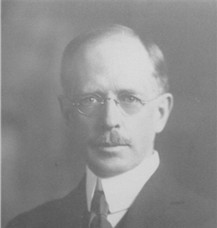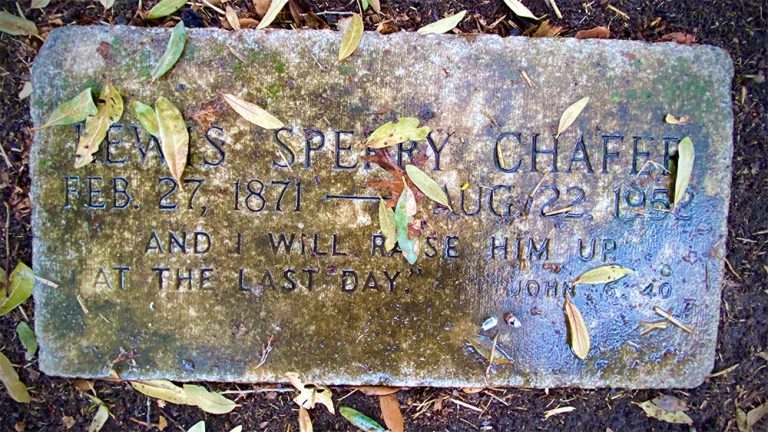Lewis Sperry Chafer
“Through all the acclaim and accomplishments, his students remember best his deep reverence for the Word, and a daily, humble dependence on the Holy Spirit.”
(Wholesome Words)
Early Life and Conversion
Lewis Sperry Chafer was born on February 27, 1871, in Rock Creek, Ohio. His upbringing was humble: his father, Thomas Chafer, served as a pastor but died from tuberculosis when Lewis was just 11 years old. His mother, Lomira, supported the family by teaching school and boarding students. In his youth Lewis displayed a strong interest in music and the gospel. He attended Oberlin College and Conservatory of Music (1889–1892) though he did not complete a full theological curriculum at that stage. Early on he began working in evangelistic music ministry, traveling with revival teams, singing and preaching.
Evangelistic & Teaching Path
In the early 1900s Chafer transitioned from music ministry into Bible teaching. In 1900 he was ordained by a council of Congregational ministers, and by 1903 he was in pastoral‐kind service in Buffalo and Massachusetts. During this period he became influenced by the work of C. I. Scofield—an influence that shaped his theological trajectory toward dispensationalism. From 1906 to 1910 Chafer taught Bible and music at Mount Hermon School for Boys in Massachusetts. Later, in 1913, he aided in the founding of the Philadelphia School of the Bible and served on its faculty.
Founding of Dallas Theological Seminary
One of Chafer’s most enduring contributions was the founding of Dallas Theological Seminary (DTS). In 1924 he and others launched Evangelical Theological College in Dallas, Texas; the institution would later adopt the name Dallas Theological Seminary and become a leading center for dispensational biblical training. Chafer served as president of DTS from its founding until his death in 1952. His vision for the seminary was rooted in three convictions: the authority and inerrancy of Scripture, the necessity of Bible‐centered theological training, and a dispensational‐premillennial eschatology.
Major Writings and Theological Contribution
Chafer was a prolific writer. Among his best‐known works are True Evangelism (1911), The Kingdom in History and Prophecy (1915), Salvation: A Clear Doctrinal Analysis (1917), Grace: The Glorious Theme (1922), and Major Bible Themes (1926). His magnum opus, however, is the eight‐volume Systematic Theology (completed in 1947–48). It is recognized as one of the earliest comprehensive theological surveys framed within a dispensational, premillennial framework. This work provided pastors and students a systematic exposition of doctrine aligned with a robust evangelical conviction. Theologically, Chafer emphasized the theme of divine grace, the believer’s position in Christ, the future return of Christ, and clear distinctions between Israel and the Church—central features of the dispensational school.
Ministry Style and Character
While Chafer was a trained musician and former evangelist, his teaching approach was marked by clarity, calm conviction, and pastoral concern. He was not known for flamboyant revivalism, but for careful Bible exposition and shepherding the next generation of teachers. Students described him as a deeply reverent man of prayer whose ministry balanced evangelism with scholarship. He combined his evangelistic roots with the academic task of training ministers, believing that the pulpit and the classroom must work together in advancing the Gospel. His pastoral heart aligned with his academic gifts.
Legacy and Impact
Lewis Sperry Chafer’s legacy is substantial and enduring across several domains:
- Institutional Legacy – Dallas Theological Seminary stands as a primary institutional legacy. DTS has trained thousands of pastors, missionaries, and teachers under the theological framework that Chafer helped establish. Furthermore, another institution bearing his name, Chafer Theological Seminary (established later), honors his name and continues to teach biblical theology in that tradition.
- Theological Influence – His writings still serve as foundational texts for dispensational theology. His Systematic Theology remains referenced by pastors and scholars interested in this tradition. The impact also spans evangelical thought in the 20th-century, particularly through his student lineage: among his protégés were notable figures in evangelical and dispensational circles.
- Evangelistic Vision – Chafer maintained an evangelistic sense throughout his life. His early revival ministry, his books on evangelism, and his emphasis that theological training must serve the church’s mission all underscore his conviction that doctrine and outreach go hand in hand.
- Grace Emphasis – One of the hallmarks of Chafer’s teaching was his emphasis on grace—not only for salvation but for daily Christian living. Works such as Grace: The Glorious Theme help highlight his belief that believers live under grace, not law.
Practical Lessons from His Life
From Chafer’s life and work, several practical lessons emerge for ministry today:
- Train the next generation with theological depth: Chafer believed deeply in equipping teachers, not just preaching. Establishing an institutional training center was central to his legacy.
- Root your ministry in Scripture: His conviction in the authority of Scripture and his commitment to verse‐by‐verse teaching remind us of the importance of biblical faithfulness.
- Combine evangelism and teaching: His ministry integrated both pulpit proclamation and classroom instruction. Today’s leaders can learn that ministry isn’t limited to one mode.
- Persist in institutional vision: Founding DTS in 1924 and serving until 1952 shows patience, long-term vision and endurance—qualities often needed for lasting impact.
- Embrace grace and mission together: Chafer’s emphasis on living under grace while championing evangelistic urgency remains relevant—both doctrines and outreach matter.
Conclusion
Lewis Sperry Chafer left a remarkable legacy: from his early life in Ohio to his evangelistic travels, his teaching at the Philadelphia School of the Bible, to founding Dallas Theological Seminary and writing major works of theology. He shaped not only an institution but a theological tradition.
While theological traditions evolve and face critique, the life of Chafer offers a case study in faithful Christian scholarship, pastoral heart, institutional commitment and gospel vision. For anyone involved in teaching, church leadership or theological training, his example remains instructive: ground yourself in Scripture, serve the church, train others, and build institutions that outlive you.
In an era of rapid change, Chafer’s focus on Bible truth, church service and gospel outreach beckons us to consider not only what we believe, but how we equip others with what we believe—and how we pass it on into the next generation.
_____
Image Source/Credit (in order):
- Wikipedia contributors. File:LewisSperryChafer1929.jpg – Wikipedia. en.wikipedia.org/wiki/File:LewisSperryChafer1929.jpg.
- rwalton@dts.edu. “A Flame That Has Endured: Commemorating the 150th Anniversary of Lewis Sperry Chafer – DTS Voice.” DTS Voice, 3 Nov. 2021, voice.dts.edu/article/a-flame-that-has-endured-commemorating-the-150th-anniversary-of-lewis-sperry-chafer.
Related
Sorry, no records were found. Please adjust your search criteria and try again.
Sorry, unable to load the Maps API.

